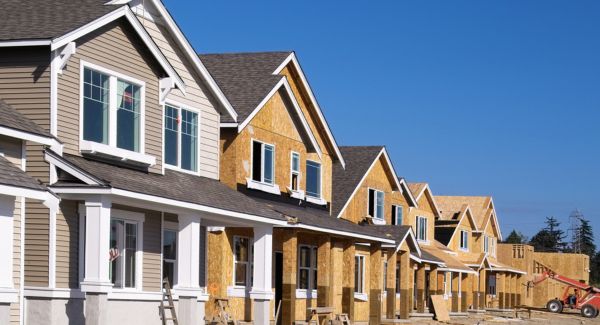
Last Updated on February 4, 2026
Searching for a new construction home this year? Good news! The latest estimate expects 1.1 million new homes to be built this year, which is a nearly 14% increase over 2024.
In the past, new construction was significantly more expensive than buying a pre-existing home, which kept many buyers on a budget away. Now, as a result of higher mortgage interest rates and low inventory challenges, buying a new home is not much different than purchasing a pre-existing home. The latest data shows the median sales price of existing homes is $398,400, compared to that of new construction homes at $414,500. Plus, in 2025 builders will be focusing on designing and constructing more affordable houses with smaller footprints.
Did you know that roughly 33% of all homes purchased today are new construction? As inventory challenges and affordability climb with existing homes, builders are responding by offering more affordable new construction housing. If you’re in the market for a new construction home, here’s how you can be a savvy shopper.
Research the home builder
Just like it’s best to research the right realtor before you buy or sell a home, it’s wise to do your homework and research home builders. Pay attention to their company history and reputation. Check out the builder’s website, but also do your due diligence and research reviews from other third-party sites. Once you feel comfortable with a prospective builder, make sure to ask these questions:
- How long will the process take?
- Is a warranty offered on the home?
- What buyer incentives do you offer right now? (see next paragraph)
- What customizations can I make?
- How large will the community be when it’s completed and will there be amenities for home owners?
- What is the HOA fee?
Ask about buyer incentives
Eager to welcome in new homeowners, builders frequently offer incentives. Savings such as closing cost reductions and offering a mortgage rate buy-down help homeowners purchasing new construction save money. Typically, to be eligible for these types of savings, you must work with the builders’ lenders.
Don’t buy without a realtor
While many builders will have a builder’s agent, it’s wise to use a realtor even when buying new construction. A realtor’s job is to ensure the transaction goes smoothly. They’ll handle the inspection and guide you as to what your next steps should be if and when potential issues arise and advocate for your behalf when it comes to negotiations for repairs and upgrades, among other things.
Don’t forgo the home inspection
There’s a common misconception that new construction doesn’t need a home inspection. This couldn’t be farther from the truth. While in theory, a new build isn’t going to have the same issues that a 40-year-old home has, that doesn’t mean new construction is free from errors.
Did you know that 25% of new homes will suffer some type of structural distress? If you’re involved with the purchase during the building process, engage your home inspector to come by during construction and after the home is complete. Home inspectors can conduct inspections as the home is being built, which allows them to see features they may not see under normal circumstances. If a builder discourages or doesn’t allow an inspection, consider it a red flag!
Just say no to upgrades
Home upgrades and customizations can come at a big cost to homeowners. It often makes more financial sense to forgo upgrades now and save up for your own upgrades down the road, as budget allows.
Ask about a warranty
Typically, new construction homes come with a warranty. But since what a warranty covers differs builder by builder, make sure you understand exactly what benefits you’re receiving. A builder who uses a third-party warranty company is preferred and you should look for a warranty that covers at least one year of defects and includes structural and functional items.
Take advantage of our Buy & Borrow Bundle
With the added value of our exclusive Buy & Borrow Bundle, homebuyers purchasing new construction have the potential to maximize their savings while taking advantage of a wider selection of homes and reduced market competition. This unique combination provides Allen Tate clients with a powerful edge in the market, offering more opportunities and better deals.
Be flexible with your timing
Spring and summer are busy months for home builders. If you can wait, you can often find increased incentives as the year comes to a close and builders are eager to sell inventory that hasn’t sold. Likewise, you can also save by getting in at the very beginning of a project, as builders are typically offering incentives to get homeowners in during the early stages. What’s more, getting in early often results in homeowners having built-in equity by the time they close due to the natural appreciation that will occur as the builder sells more properties in the community.
If you can’t get in towards the beginning of the housing development, the next best thing is to buy as the neighborhood is wrapping up, as builders are eager to sell the remaining properties.
If you liked this post, check out the pros and cons of new construction and 5 mistakes to avoid when buying a new construction home.
__________________________
Howard Hanna Allen Tate Real Estate is the #1 real estate company in the Carolinas, with more than 80 offices and 2,000 agents serving communities across North and South Carolina and Georgia. As part of Howard Hanna Real Estate Services, the largest family-owned and operated real estate company in the United States, Howard Hanna Allen Tate offers a full suite of real estate services, including mortgage, insurance, title and relocation. For more information, visit www.howardhannatate.com.



